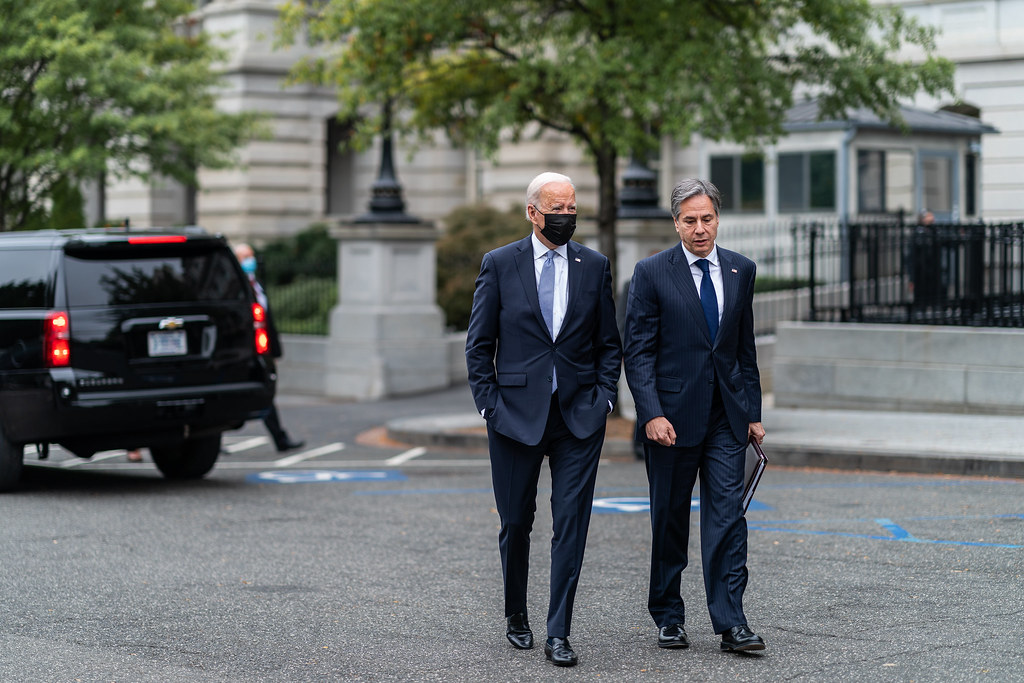Australia/Israel Review
A misguided blame game on Iran
Feb 1, 2022 | Behnam Ben Taleblu

“A fool throws a stone into a well and a hundred wise men can’t get it out,” is a popular Persian saying stressing the lasting consequence of actions taken by unlearned or inexperienced people.
The Biden Administration is channelling this maxim – with former President Trump as the “fool” and the decision to withdraw from the 2015 Iran nuclear deal as “the stone” – as its go-to response for why things have gone from bad to worse on Iran policy under President Joe Biden’s watch, despite his promise of a “smarter” approach.
On the sidelines of a conference in Rome last October, Biden blamed his predecessor for the deadlock in negotiations and Iran’s atomic advances. “We’re continuing to suffer from the very bad decisions President Trump made to pull out of the JCPOA,” he said, using the acronym for the 2015 agreement, the Joint Comprehensive Plan of Action. Less than two months later, Secretary of State Antony Blinken amplified that assessment, saying, “we are where we are because of what I consider to be one of the worst decisions made in American foreign policy in the last decade, and that was getting out of the Iran nuclear agreement.”
While the former president did indeed cease US participation in the JCPOA on May 8, 2018, the Islamic Republic’s enmity with America far predates this decision. Moreover, the main vectors for Iranian escalation since 2018 – nuclear, missile, regional, maritime, and cyber – have all been problem areas in the past and are what make it such an outsized threat. They are not new aggressions Iran has chosen to develop or employ, as White House Press Secretary Jen Psaki incorrectly alleged recently.
Should Iran’s post-2018 heightened uranium enrichment levels, growing uranium stockpile, use of advanced centrifuges, and other activities be seen as the problem, then it is worth recalling that Trump merely expedited what the JCPOA already ordained, just on more favourable financial terms for Washington. The JCPOA was at best, a time-out temporarily halting select Iranian nuclear activities. Leaving the JCPOA simply meant not choosing to pay for that time-out.
One of the deal’s myriad shortcomings was these nuclear time-outs, technically known as “sunset clauses”, which pave the way for a rapid expansion of Iranian nuclear capacity. One example pertains to advanced centrifuges, which can be gradually employed starting six years after the deal is in effect. President Obama invoked these machines when he famously said in 2015 that starting from year 13 of the deal, Iran’s “breakout” time could be near zero.
As indirect nuclear talks to resurrect the JCPOA lurch into the new year with no agreement to date, a recent revelation by Axios confirms that the Administration is predictably embarking on a domestic political messaging campaign that can be summarised as follows: We failed in our objectives because of Trump.
This strategy is likely to be employed for a range of suboptimal outcomes, which might include an agreement worse than the JCPOA, or a collapse in the talks that leads to war, a potential Iranian nuclear weapon, or a threshold capability in which the regime could end up being a screwdriver’s turn away from the bomb.
Amid the political blame game, the Administration cannot see how its conciliatory approach toward Iran over the past year has underwritten both Iranian diplomatic intransigence and “irreversible” nuclear knowledge and capabilities. After a year in office, Biden now owns the Iran policy impasse. The Administration consciously chose to denigrate and shed leverage created by the coercive and punitive economic pressure policy of its predecessor. And throughout 2021, it failed to take a range of actions like diplomatic censure in multilateral forums or vigorous enforcement of existing US oil sanctions that could have improved the chances of even its stated aim of resurrecting the JCPOA.
The Biden Administration’s Iran policy on non-nuclear matters has similarly failed to convince Teheran that Washington means business. The Administration’s delisting of the Iranian-backed Houthi rebels in Yemen has not brought peace to the Arabian Peninsula. Allowing Iran to pay its UN dues using funds previously frozen in South Korea has only emboldened its desire to access these revenues and press US allies holding them to violate sanctions. And Washington’s vacillation between occasional military responses and turning a blind eye to increasing Iran-backed escalation and attacks on US positions in the heartland of the Middle East has not deterred Iran and its constellation of proxies, the “Axis of Resistance,” from engaging in more attacks.
Rather than squander precious time laying the groundwork for a domestic political blame game, the Administration should be developing tools that can make diplomacy more efficacious and its military deterrence more credible. This means enforcing existing sanctions on the Islamic Republic, including on its oil sales, smuggling, and regional trade networks, as well as convening a previously threatened special session of the International Atomic Energy Agency to censure Iran. On the military front, this means working with regional partners to make sure they have the necessary air and missile defence systems to devalue and offset Iran’s growing long-range and precision-strike capabilities and those of its proxies, as well as actively interdicting the flow of arms from Iran that continue to keep regional hotspots like Yemen, Syria, and Iraq engulfed in conflict.
Staying the political warfare route would not only be tantamount to a retreat from the promise of “non-partisanship” in US foreign policy that Blinken promised in his first major speech in 2021, but a true fool’s errand to begin 2022 with.
Behnam Ben Taleblu is a senior fellow of the Foundation for Defense of Democracies (FDD) in Washington DC, where he focuses on Iranian political and security issues. This article first appeared in the Dispatch (thedispatch.com). © FDD (www.fdd.org), reprinted by permission, all rights reserved.
Tags: Iran, JCPOA, United States






